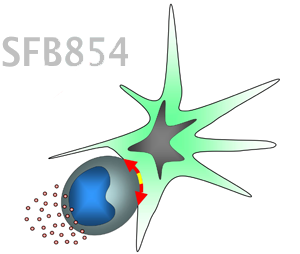The newly founded Research Training Group 2408 (RTG 2408) at the Otto von Guericke University Magdeburg offers 10 PhD positions for talented and highly motivated students. The RTG 2408 is funded by the DFG (Deutsche Forschungsgemeinschaft) with funds from the federal republic of Germany.
The RTG 2408 investigates in an innovative research field: maladaptive processes at physiological barriers in the context of chronic diseases. Precisely, investigators explore maladaptive mechanisms e.g., of the endoplasmic reticulum, the ubiquitin-proteasomal system, and mitochondria in the context of gastro-intestinal diseases (Prof. Naumann, Prof. Schlüter, Prof. Bruder), atherosclerosis (Prof. Braun-Dullaeus, Dr. Shahzad), renal diseases (Prof. Mertens, Prof. Isermann), and chronic skin inflammation (Prof. Dudeck). Prominently, we investigate the perpetuation of molecular disease processes by posttranslational modifications (PTMs) of histones, transcription factors (NF-kB, YB-1, HIF, ATF4, ATF6, sXBP1), and protease activated receptors. The analyses of the cellular micromilieu associated with an aggravation of barrier disruption will be an important aspect. The students will be exposed to state of the art translational studies involving microfluidics technology, organoid culture and analyses, assays for proteostasis and PTMs, and innovative mouse models. A structured supervision and tuition program, including career paths information, net-working priming, aspects of professionalism on top of scientific education, accompanies the RTG 2408. Co-operations with colleagues in the University, e.g. in the Center of Dynamic Systems (CDS) and the Gesundheitscampus (GC-I³), and various external partners in the Max Planck Institute and the Leibniz Institute in Magdeburg, as well as the Fraunhofer Institute in Dresden and the Helmholtz-Center in Braunschweig, are set up. This will ensure a timely completion of the thesis and well-thought-out tuition in various aspects of scientific career planning. Thus, the positions will offer an opportunity to learn cutting edge techniques in a competitive and instructive environment.
Applicants with expertise in state-of-the-art techniques in Life Sciences (including, but not limited to, cloning, proteostasis, molecular biology and protein biochemistry) will receive high consideration. The positions are funded initially for 1 year with the option of extension for up to 4 years.
Applicants should send a detailed CV, any publications, and two references until the 6th of August 2018 to the speaker of the RTG:
Prof. Dr. Berend Isermann
Institute for Clinical Chemistry and Pathobiochemistry
Otto von Guericke University Magdeburg
Germany




